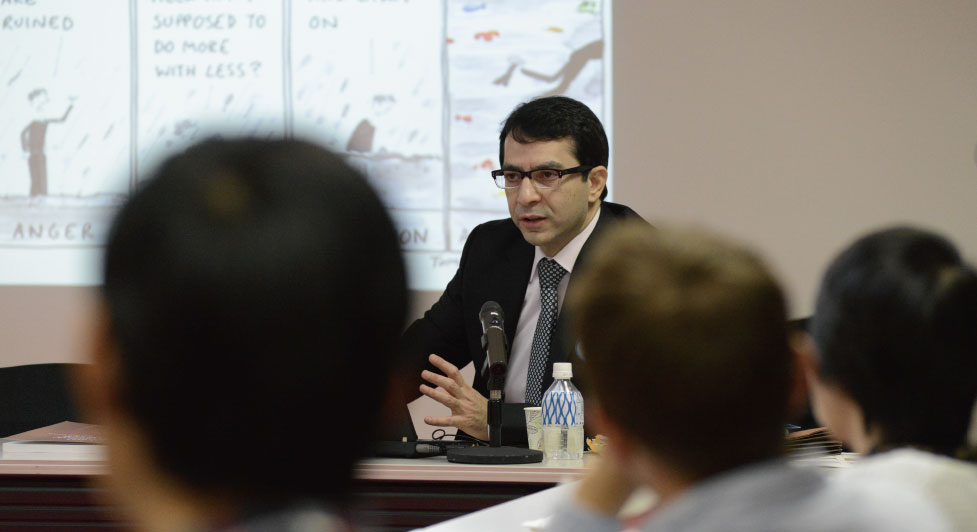News Archives
2016.2.18
Seminar “Global Economic Prospects:Spillovers amid Weak Growth”
How is the health of the global economy? What are the major risks that lie ahead and what are the main policy challenges? Ayhan Kose, Director of the World Bank Group’s Development Prospects Group who leads the banks’ work on global economic forecasting shares his opinion as part of a special seminar at GRIPS, February 18.
Uncertainty and pessimism dominated business news throughout much of 2015. While at face value the mood seemed justified as many negative factors (China’s slowdown, a collapse in oil prices and other commodities, and financial market turbulence) seemed to be colluding, according to Kose, this year shouldn’t include a global recession. The way he sees it, growth should modestly pick up with a few positives on the horizons such as the recent signing of the Transpacific Trade Agreement (TPP) potentially providing a welcome boost to trade.
With Kose managing the publication, the World Bank released the 2016 Global Economic Prospects report in January, a flagship report the World Bank has produced annually since 1960. Kose outlined the reports key points during the seminar attended by GRIPS academic staff and students. Kose argues that while weak growth among major emerging markets will have an impact on global growth in 2016, economic activity should still pick up modestly to a 2.9 percent pace, from 2.4 percent growth in 2015, as advanced economies gain speed. On the other hand, developing economies forecasted growth is 4.8 percent in 2016, up from a post GFC low of 4.3 percent in 2015. Kose also feels growth in China is projected to slow further, while Russia and Brazil will remain in recession for the remainder of the year. India, he says is the bright spot amongst much economic malaise.
Economic forecasting is by no means an exact science. Kose introduced several substantial downside risks which if realized could destroy any chance of the global economy growing. These include further slowdowns in major emerging market economies, financial market turmoil arising from sudden shifts in borrowing costs amid deteriorateing fundamentals, lingering vulnerabilities in some countries, and heightened geopolitical tensions such as the territorial disputes of numerous islands in the South China Sea. If realized, a spillover effect could have global repercussions and pose a threat to hard-won gains in raising people out of poverty.
He believes that China is critical since China’s debt accumulation has been quite rapid, and quite massive. Accumulating debt is not necessarily a problem if the economy is growing but in China growth is slowing, whilst debt is increasing. In the past, when these types of scenarios have taken place, the ending was not necessarily pleasant. So the question for China is whether they can create for themselves a soft landing.
In the past, when we think about spillovers at the global level, we focused on spills from advanced economies, especially the US. Now, we need to think a lot about the spillovers from large emerging markets as they have become the driving engines of the global economy. This is why structural reform – particularly in emerging market economies is is critical. According to Kose, reforms that improve economic governance, labor market
functioning, and the efficient allocation of capital will help boost productivity, and will also serve to offset the demographic headwinds facing many of these economies.
Kose ended his presentation with a cartoon nicely summing up the fragility of the current global economy. The cartoon depicted a staircase leading to recovery however on each step lay a carton of eggs. The message being, the journey to more a prosperous future is achievable, but will be made on tenuous ground.
Article by GRIPS Public Relations Department






